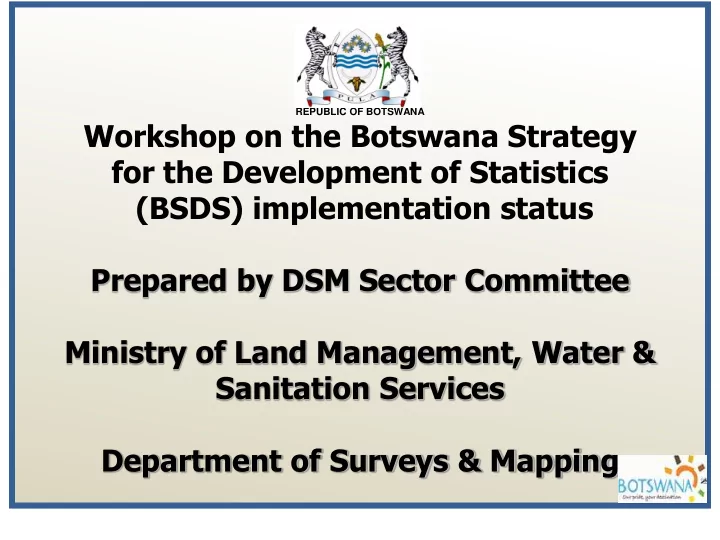

REPUBLIC OF BOTSWANA Workshop on the Botswana Strategy for the Development of Statistics (BSDS) implementation status Prepared by DSM Sector Committee Ministry of Land Management, Water & Sanitation Services Department of Surveys & Mapping
Presentation Layout Background • Progress made on the sector initiatives • Achievements Challenges • Proposed Interventions • Proposed initiatives for the next financial • year(2017/18) Capacity Building priorities for 2017/18 •
Background DSM provides basic geographic information & services. It is therefore important to improve how it is collected, managed, disseminated & used in the country. Formation of DSM Sector Committee: 2013 SB approached DSM to assess its state of geographic data in order to provide the basis for the design of the Statistics Strategic Plan for the Department. Formation of DSM Sector committee (9 members)
Workshops & meetings were held to compile Statistics Strategic Plan basing on the assessment tool provided by SB. Main Findings of the assessment Advocacy : Lot of advocacy activities e.g. through outreach programmes such as exhibitions, media e.t.c to create greater awareness . Coordination: DSM has well-coordinated business processes including a central repository. extended to three regions resulting in an improved access & retrieval of data.
Main Findings cont.. Resources: high staff turnover especially among staff with scarce skills, funding from government is inadequate and this has constrained a number of technical operations of the department & there is inadequate training in specialised areas resulting in critical skills gaps. Infrastructure : Is inadequate for geospatial information system e.g. vehicles, technology.
Main Findings cont.. Data Quality : Inadequate stakeholder consultation, Different data sources, data are not always available in readily usable formats. Non-adherence to existing policies e.g Land • Survey Act. Lack of metadata on geo-information products due to shortage of manpower & inadequate appreciation of the importance of metadata.
Formulation of Goals and Objectives: Goal 1: Evidence-based policy, planning & decision-making in the sector Improve statistical advocacy. • Promote use of statistics for evidence-based policy and decision- • making. Goal 2: A well-coordinated geo-information system Establish coordinating structures and mechanisms across the • Department. Monitor and enforce compliance with geo-information standards. • Goal 3: Improved quality of geo-information data Improve understanding & prioritisation of user needs • Improve data collection, processing & storage, data analysis, • packaging, dissemination & access Build capacity & develop skills for geospatial data & information • Build infrastructure for geospatial data & information •
Progress made on the sector initiatives Initiatives Achievement Challenges Interventio s ns 1. Upgrade Portal upgraded 1) Not yet 1) To be Disseminati through CIS launched launched on project (P2M) our 2) Only access 2017/18 component budget was (P1M) on govt (Portal) network 2) NSDI to Develop & DSM address this Implement communication communication developed & plan Implemented
Progress made on the Sector Initiatives Initiati Achievement Challeng Interventions ves s es 2. Upgrade Storage is 90% a) Delays in a) Frequent Data complete shipment of Communication Repository equipment with project /Storage b) Down manager. Server time. b) Working on afterhours/weeke nds 3.Conduct Reports are Some of the a) Officers are compiled monthly Customer customers frequently advised & service delivery is satisfaction reluctant to to issue improved through Survey fill in the questionnaires to customer feedback forms. customers
Progress made on the Sector Initiatives Initiative Achievement Challenges Interventions s s 4. Records a) Records a) Still checking if Digitalize/Sc Scanned: scanned not scanned records an Records Survey/R as per CIS can accommodate 2016/17=1 915 system the bar coding system 2014/15 GP = b) Shortage of 4150 Manpower to b) Employment of sort records 5 TEMP officers Maps:2015/16 =600 2016/17= 600
Progress made on the Sector Initiatives Initiatives Achieveme Challenges Interventions nts 4. Develop NSDI: Increase • Data sharing Draft data Lack of awareness • • Policy sharing awareness from policy. management Many to stakeholders • Technical projects are • Standards being run by few Metadata Depts. • under review
Progress made on the Sector Initiatives Initiativ Achieveme Challenges Intervention es nts s Develop & Implement Advocacy programme Expand Geo-Information Sector Committee: Letter written but no follow up made Resources Mobilization
Proposed initiatives for the next financial year (2017/18) 1. Continue Digitation of DSM Records 2. Expand Geo-Information Sector Committee 3. Continue Develop Data sharing Policy 4. Review of Geo Informatics Division structure to facilitate sector coordination
Capacity Building priorities for 2017/18 1. SB to train DSM Sector Committee on how handle and compile statistics. 2. Attachee from SB to established DSM Sector Unit. 3. Increase awareness from management to stakeholders
Thank You Mr Kabelo Gare and Seabelo Oitsile
Recommend
More recommend